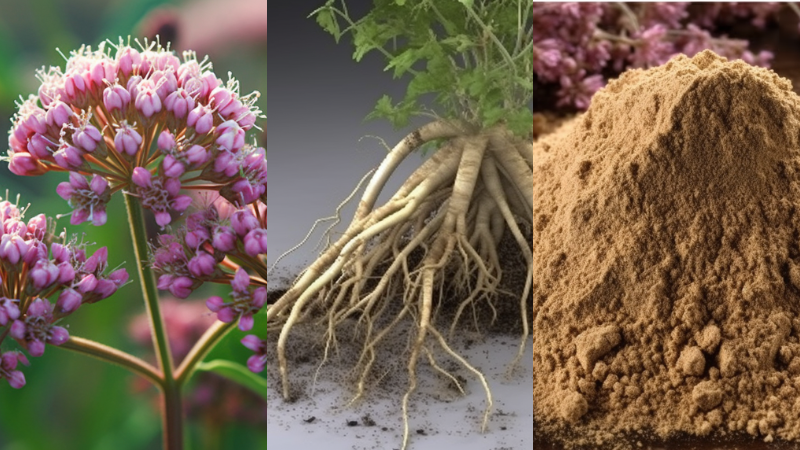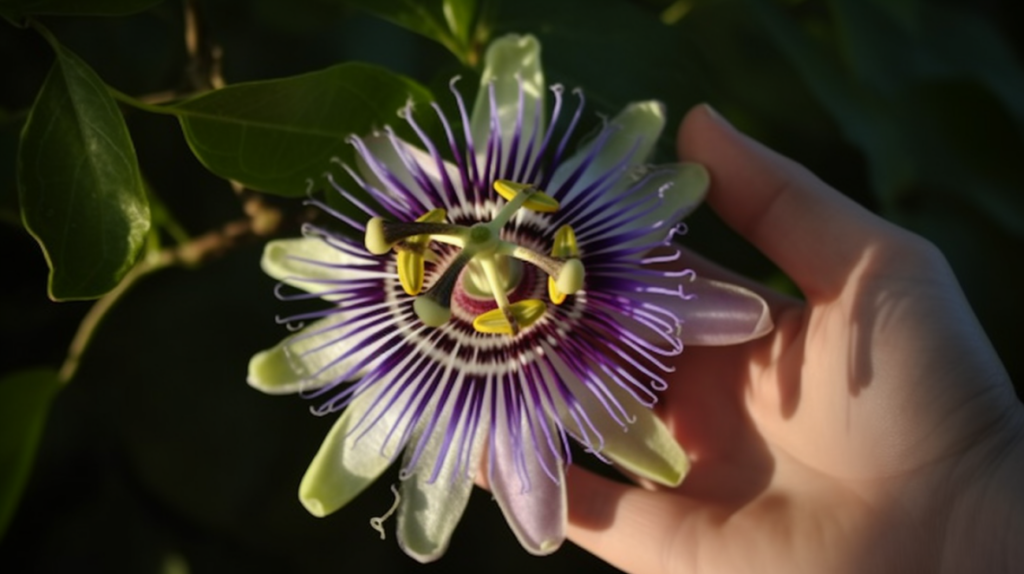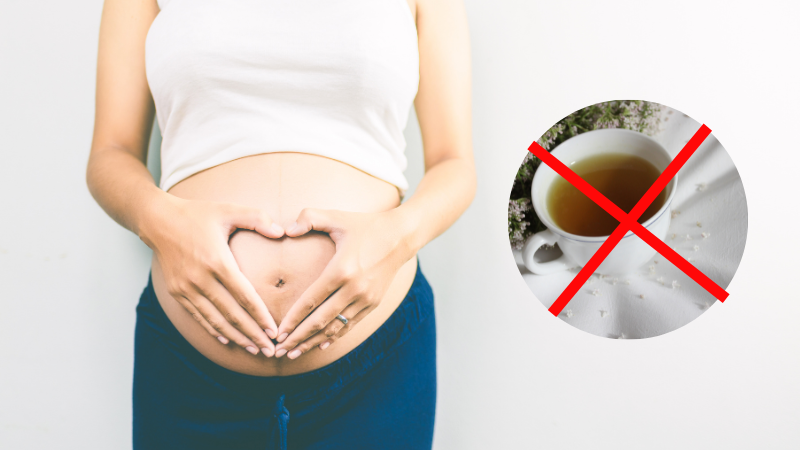Ever tossed and turned in bed, counting sheep or staring at the ceiling, desperately wishing for the Sandman to whisk you away to Dreamland? You’re not alone. But what if I told you that the secret to a peaceful night’s sleep might be hiding in the petals of a flower, or the roots of a plant? Are you intrigued? Let’s discuss passion flower vs valerian. Nature’s very own sleep wizards.
These two botanical wonders have been the talk of the town among sleep enthusiasts and health gurus alike. But which one reigns supreme in the quest for the ultimate snooze?
Stick around as we dive deep into the fascinating world of passionflower and valerian, and unravel the mystery of how they can help you in your quest for sleeping soundly. Keep reading to find out why the passion flower vs valerian debate is shaking up the world of natural sleep remedies.
Table of Contents
Passionflower vs Valerian Root: An Overview
So, what exactly is valerian root? Valerian is more than just an ancient herb that has whispered lullabies to restless minds for centuries.
Originating from North America, Asia, and Europe, this perennial herb has a history as rich as its earthy aroma. It is also called Valeriana officinalis, the star of the show, and has been long regarded as a go-to sleep aid in traditional medicine. 1
But what makes it so essential? The answer lies in its complex chemical makeup. It’s a cocktail of active compounds like:
- Sesquiterpenes 2
- Iridoids (valepotriates), and
- free amino acids such as γ-aminobutyric acid (GABA). 3
These compounds don’t just work alone; they synergise to create a calming effect that has been the subject of numerous studies. 4

By enhancing GABA’s calming effects, Valerian helps to quiet the mind and prepare the body for restful sleep.
It’s not just a folk remedy; a systematic review and meta-analysis studies have shown that valerian can significantly improve sleep quality and reduce the time it takes to fall asleep.
Patients taking valerian had an 80% greater chance of reporting improved sleep compared with patients taking placebo. However, it is worth keeping in mind that there was evidence of publication bias. 5
While the scientific jury is arguably still out on its definitive benefits, valerian remains a popular choice for those seeking a natural route to dreamland. So, if you’re tossing and turning at night, perhaps it’s time to turn to this age-old herbal remedy and explore what it has to offer.
Intrigued? Keep reading, as we delve deeper into the fascinating world of passion flower vs valerian. Specifically, as we consider its floral counterpart; passion flower.
What is Passion Flower?
Come with me as we step into the world of passion flower. Known more precisely as Passiflora incarnata, this is a botanical wonder that has captivated both traditional healers and modern researchers alike.
With roots tracing back to the native to the southeastern United States and Central and South America, this ethereal bloom has been a staple in herbal medicine for its calming properties. 6

But what’s the secret behind its tranquillising allure?
The answer lies in its intricate blend of active compounds, including:
- Flavonoids
- Carboline alkaloids, and
- Cyanogenic glycosides.
These elements are thought to interact with our GABA system, the brain’s own “chill-out” neurotransmitter, offering potential relief from anxiety, neuralgia, and sleeplessness.
If you’re intrigued by the potential benefits of Passionflower and wondering about the right dosage and timing, you’re in luck! We’ve crafted a dedicated article titled “What is Passionflower Tea Good For?” that dives deep into the history of Passionflower and its benefits.
Don’t miss out on this comprehensive guide to make the most of this natural wonder for your well-being.
What Passionflower does do to our body?
Passionflower is often framed as a natural remedy in the form of a dietary supplement, aimed at alleviating anxiety and sleep issues. Also, it’s suggested for a variety of other concerns, including:
- Pain management 7
- High blood pressure and heart rate 8
- Symptoms related to menopause, and 9
- Attention-deficit hyperactivity disorder (ADHD). 10 11
Passionflower was found to not only lessen the intensity of seizures but it was observed to also decrease periods of immobility while maintaining stable levels of serotonin and noradrenaline in the brain. 12
Additionally, in healthy adults, drinking passionflower tea led to short-term improvements in the quality of sleep.
While the scientific community is still piecing together the full scope of its efficacy, passionflower continues to be a subject of fascination and study. Therefore, it is a worthy consideration in the passion flower vs valerian discussion.
Passion Flower vs Valerian Root – Recommended Dosage, Forms of Availability, When To Take This Product
Let’s start by clarifying that none of the content found here is seeking to provide medical advice. Nor is it seeking to replace the often necessary relationship between a trusted healthcare provider and their patient. This is simply shared as illustrative information to help you enter into more meaningful conversations with your chosen Specialist.
Studies have determined that when passionflower is prepared as a tea it can be consumed two to three times daily. Typically, one cup of hot water is steeped with around one teaspoon of the dried herb for roughly 10 minutes.
For capsule use, many practitioners suggest that children and teenagers should begin with a minimal dosage. This is typically around the lowest available being 200 mg capsules, taken two to three times a day. 13
The dosage may gradually be increased under suitably qualified supervision while keeping an eye on effectiveness and any potential side effects.
If you’re considering Valerian root as a natural remedy for insomnia or mild anxiety, you’ll find it available in multiple forms, including aqueous extracts, and capsules, and even combined with other herbs. The form will have a direct relationship with the overall effect.
When it comes to dosage, studies suggest that a nightly intake of 400 to 600 mg of Valerian extract can be effective in improving sleep quality.
If you require a relaxing tea, you could try steeping about one teaspoon of dried Valerian root in a cup of boiling water for 10 minutes. Specialists are likely to advise enjoying a brew up to two to three times a day at most.
For those considering capsules, especially children and adolescents, again, specialists typically advise starting with a low dose of no more than 200 mg. The frequency of consumption is normally capped at two to three times daily, but this requires individual advice.
The dosage can be adjusted gradually under qualified supervision while monitoring for effectiveness and any potential side effects.
So, whether you’re a restless sleeper or just looking for a natural way to unwind, Valerian may well offer a solution as a versatile and time-tested option.
Making sure you have a reliable source of quality herbs is no small feat. This is why we have chosen the HerbiTea range. The HerbiTea Team are committed to sourcing the best ingredients and the combination of passion flower and valerian in their Sleepy Tea blend is complemented nicely with chamomile and peppermint for sweetness and uplifting tones.
Passionflower and Valerian Root Special Precautions: What You Need to Know
As we explore the natural remedies for sleep and relaxation, the comparables between passion flower vs valerian prove they stand out as botanical gems.
However, like with any remedy, they come with their own set of precautions that should be considered for safe and effective use. Some to consider include:
Considerations During Pregnancy
According to research, the use of passionflower during pregnancy is not well-studied and could pose risks. Some compounds in passionflower and valerian may interact with hormones and neurotransmitters that are vital for a healthy pregnancy.14
If you’re pregnant, or planning to be, we’ve crafted an in-depth article “The Effects of Valerian Root When Pregnant: 4 Comprehensive Guide to Safety and Benefits” to gain insightful knowledge.
Passion Flower vs Valerian and Upcoming Surgery
Valerian and Passionflower have a sedative effect on the central nervous system, much like anesthesia and certain surgical medications.
Combining these herbs with anaesthetics could lead to adverse effects. Therefore, it’s advised to discontinue their use at least two weeks before any planned surgical procedure.15 16
Considering Your Children’s Needs
Passionflower is generally deemed safe for kids. The appropriate dosage for a child should be determined based on their weight as advised by a qualified practitioner.
Valerian can be of benefit to children with intellectual deficits by significantly reducing the time it takes for them to fall asleep and minimising the time they are awake during the night. It also extends their overall sleep duration and improves sleep quality. The treatment is particularly effective for children who have hyperactivity-related issues. 17

While Valerian is often hailed for its calming properties, researchers have found that valerian consumption did not have a significant impact on brain weight, cerebral cortex volume, or copper levels in pregnant women, but it did significantly decrease the level of zinc in the fetal brain.18
Understandably, the study concludes that its use should be limited during pregnancy due to the decrease in zinc levels.
GABA benefits: The Ultimate Goal
Both Valerian root and Passionflower have unique mechanisms that aid in sleep and anxiety. Valerian root contains compounds like valerenic acid that interact with the gamma-aminobutyric acid (GABA) neurotransmitter in the brain, enhancing its calming effects. 19 20
Furthermore, Researchers indicated that taking passionflower for a four-week period effectively eased sleep-related issues. They also suggested that it may serve as a substitute for first-line treatment with psychotropic medications for anxiety and sleep disorders. Participants were reported as experiencing lower levels of anxiety as a result of the study. 21
FAQs
Is Passion Flower better than Valerian?
It’s not accurate to say that Passionflower is definitively better than Valerian or vice versa, as their effectiveness can vary from person to person based on individual needs and body chemistry. Both have been shown to aid in sleep and anxiety relief, but the best choice depends on your specific symptoms and how your body reacts to each herb.
Can you take Valerian Root with Passionflower?
Yes, Valerian root and Passionflower are often combined in herbal remedies for sleep and anxiety. However, it’s important to consult a healthcare professional for personalised advice, especially if you’re taking other medications or have underlying health conditions.
What are the 3 Sisters of Sleep?
The “Three Sisters of Sleep” commonly refer to Valerian, Hops, and Lemon Balm. These herbs are often used in combination to create a more potent natural remedy for sleep issues and anxiety. Each herb contributes its own unique calming and sedative properties to the blend.
What is stronger than Valerian?
Prescription sleep medications like benzodiazepines and non-benzodiazepine hypnotics (e.g. Ambien and Lunesta) are generally considered stronger than valerian for inducing sleep. However, these medications come with a higher risk of side effects and dependency, so it’s crucial to consult a healthcare professional for appropriate treatment options.
Conclusion
Our in-depth look at passionflower and valerian proves that the natural world has some intriguing answers for those who struggle to get a good night’s sleep.
While passionflower calms the mind with its flavonoids and other active compounds, valerian takes a more direct approach, enhancing the GABA neurotransmitter’s calming effects.
Both have their merits, but it’s essential to consult a healthcare professional for personalised advice, especially for special populations like pregnant women.
What are your thoughts on the Passion Flower vs Valerian conversation? Join the discussion on Pinterest and Instagram!
References
- “Valerian” – S. Hadley, J. Petry, 15 April 2003 [American Family Physician] [Archive] ↩︎
- “Iridoids and Sesquiterpenoids from the Roots of Valeriana officinalis” – P. Wang, J. Hu, X. Ran, Z. Chen, H. Jiang, Y. Liu, J. Zhou, Y. Zhao, 19 August 2009 [ACS Publications] [Archive] ↩︎
- “The effects of valerian root on hot flashes in menopausal women” – P. Mirabi, F. Mojab, Last checked 1 September 2023 [PubMed] [Archive] ↩︎
- “Valerian” – URMC Staff, Last checked 30 August 2023 [University of Rochester Medical Center] [Archive] ↩︎
- “Valerian for Sleep: A Systematic Review and Meta-Analysis” – S. Bent, A. Padula, D. Moore, M. Patterson, W. Mehling, 13 April 2015 [PubMed] [Archive] ↩︎
- “Passionflower” – PubMed Staff, Last checked 30 August 2023 [PubMed] [Archive] ↩︎
- “Passiflora incarnata attenuation of neuropathic allodynia and vulvodynia apropos GABA-ergic and opioidergic antinociceptive and behavioural mechanisms” – U. Aman, F. Subhan, M. Shahid, S. Akbar, N. Ahmad, G. Ali, K. Fawad, R. Sewell, 24 February 2016 [PubMed] [Archive] ↩︎
- “Short-term Effects of Passiflora and Meditation on Blood Pressure and Heart Rate” – K. Sanders, 16 May 2019 [PubMed] [Archive] ↩︎
- “The effects of valerian root on hot flashes in menopausal women” – P. Mirabi, F. Mojab, Last checked 1 September 2023 [PubMed] [Archive] ↩︎
- “Passiflora” – Science Direct Staff, Last checked 30 August 2023 [Science Direct] [Archive] ↩︎
- “Passiflora incarnata in the treatment of attention-deficit hyperactivity disorder in children and adolescents” – S. Akhondzadeh, M. Mohammadi, F. Momeni, Last checked 30 August 2023 [Open Access Journal] [Archive] ↩︎
- “Dual protective effect of Passiflora incarnata in epilepsy and associated post-ictal depression” – B. Singh, D. Singh, R. Goel, 6 Jan 2012 [PubMed] [Archive] ↩︎
- “Nutritional and Herbal Therapies for Children and Adolescents” – G. Kapalka, 14 May 2010 [Science Direct] [Archive] ↩︎
- “Pregnancy outcomes in psychiatric patients treated with passiflora incarnata” – Z. Ozturk, C. Kalayci, 14 November 2017 [PubMed] [Archive] ↩︎
- “Valerian – Uses, Side Effects, and More” – WebMD Staff, Last checked 30 August 2023 [Web MD] [Archive] ↩︎
- “Passionflower – Uses, Side Effects, and More” – Web MD Staff, Last checked 30 August 2023 [Web MD] [Archive] ↩︎
- “Effect of valerian, Valeriana edulis, on sleep difficulties in children with intellectual deficits: randomised trial” – A. Francis, R. Dempster, 9 May 2002 [PubMed] [Archive] ↩︎
- “Effects of valerian consumption during pregnancy on cortical volume and the levels of zinc and copper in the brain tissue of mouse fetus” – A. Mahmoudian, Z. Rajaei, H. Haghir, S. Banihashemian, J. Hami, 10 April 2012 [PubMed] [Archive] ↩︎
- “Passionflower” – Mount Sinai Staff, Last checked 1 September 2023 [Mount Sinai] [Archive] ↩︎
- “The gamma-aminobutyric acidergic effects of valerian and valerenic acid on rat brainstem neuronal activity” – C. Yuan, S. Mehendale, Y. Xiao, H. Aung, J. Xie, M. Lee, Last checked 1 September 2023 [PubMed] [Archive] ↩︎
- “Open-label observational study of the homeopathic medicine Passiflora Compose for anxiety and sleep disorders” – S. Villet, V. Vacher, A. Colas, K. Danno, J. Masson, P. Marijnen, M. Borden, 29 August 2015 [PubMed] [Archive] ↩︎
Last Updated on 6 months by D&C Editorial Team


